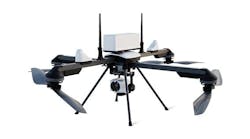K-State Salina Adding UAS Cybersecurity Concentration to Master's Degree Program
SALINA — In today's technological era, protecting information has become paramount. And with processing, storing and transporting communication an extensive component of unmanned aircraft systems, or UAS, Kansas State University Salina is expanding its curriculum offerings to provide solutions for this type of security.
K-State Salina is adding an unmanned aircraft systems cybersecurity concentration to its Professional Master of Technology and is currently enrolling students for the inaugural class beginning Monday, June 8. This new academic emphasis is online-based and gives interested students the flexibility of either working toward a master's degree or taking individual courses to help advance their knowledge and specialize in a niche within the unmanned aircraft systems industry.
"I'm pleased that we're moving toward educating students on the cybersecurity issues that affect unmanned aircraft systems," said Kurt Barnhart, K-State Salina's associate dean of research and engagement. "We've had a strength in the area of UAS research and education for many years now, and as this technology proliferates, it will become increasingly important that we teach students to have a better grasp of the vulnerabilities of these systems and how to protect them to prevent misuse."
Unmanned aircraft systems use computer networking for critical control systems, communication, navigation, payload delivery and intelligence coordination from various land, sea, air and satellite platforms. One of the biggest cybersecurity threats is that as the applications of UAS grow, the potential of an organization interfering or taking command of the information control system also increases.
In the first UAS cybersecurity-focused class, students will learn basic principles of information security, or InfoSec, and risk analysis and assessment. They will study UAS information sources and components that examine the identification of cyberthreats and vulnerabilities to systems. In addition, students will create a taxonomy of risks and required countermeasures to mitigate the danger to UAS systems as well as investigate the drone crash database to identify potential threat exposure and correlate incidents to supervisory control and data acquisition, or SCADA, or cyberattack vectors.
Two more special topics courses for the UAS cybersecurity concentration will be offered in the fall and then a final two in spring 2016. For more information on enrollment in the Professional Master of Technology program or to sign up exclusively for the first class, contact program director Raju Dandu at 785-826-2629 or [email protected].

